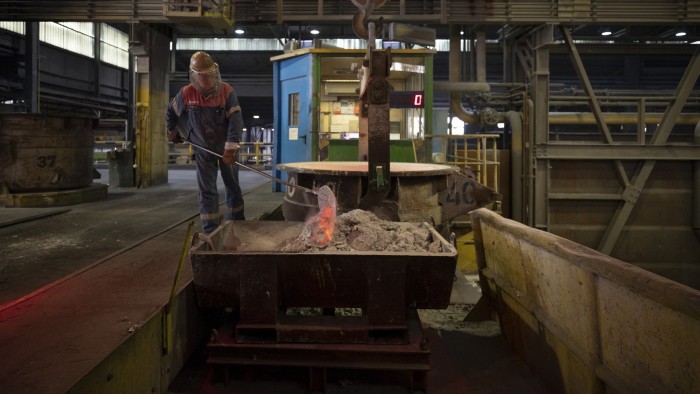Unlock the Editor’s Digest for free
Roula Khalaf, Editor of the FT, selects her favourite stories in this weekly newsletter.
Brussels is preparing emergency measures to support the EU’s ailing aluminium industry as Donald Trump’s tariff regime diverts European scrap to the US, leaving local recycling plants in a fight for survival.
The US president’s levies have dealt a double blow to the sector with an annual turnover of €40bn which directly employs 250,000 people and supports a further 1mn jobs in Europe.
While exports to the US are subject to a 50 per cent levy, hitting sales, shipments of scrap are exempt from any duties.
Tariffs have driven up domestic US aluminium prices, giving producers there the revenue to pay higher prices for old metal that can be reused to make fresh products.
The scrap shortage is leading to European recycling plants and smelters being mothballed.
“Plants are already shutting down capacity, and for our recyclers this is not about shrinking profit margins but survival,” warned Paul Voss, head of trade body European Aluminium, adding that the bloc only had “weeks to get this right”.
The European Commission is considering a number of measures that it plans to announce in September. Two officials said they could include a levy on all EU scrap exports to the world.
“By the end of the third quarter at the latest, the commission will consider trade measures to ensure sufficient availability of scrap,” said one, although both officials stressed that no final decision had yet been made.
The aluminium industry is essential for clean technologies such as electric vehicles and wind turbines.
Scrap dealing is a highly competitive market in which the waste industry sells metal to the highest bidder globally. European producers also struggle to compete with US and Chinese smelters because the latter have far lower energy costs.
The EU-US framework trade deal agreed in Scotland last month failed to lower tariffs on aluminium and steel. It instead promised to work towards supply chain rules that would seek to reduce US reliance on Europe while locking Chinese steel out of the transatlantic market.
Brussels is pushing for a quota that would spare some EU steel and aluminium exports from tariffs, which would be close to historic export volumes.
Between 2019 and 2024, EU exports of aluminium scrap grew by 53 per cent, while domestic use was up only 5 per cent.
While Asia, led by China, accounts for two-thirds of EU scrap exports, sales have recently shot up in the US. They almost tripled in the first three months of the year, and US scrap prices are now 20 per cent higher than European ones, according to data provided by European Aluminium.
Trump applied tariffs on finished products in March.

Customers such as drink can makers are increasingly demanding higher recycled metal content, further fuelling demand. The EU industry has invested heavily in recycling furnaces but receives about 2mn fewer tonnes of scrap than it can process.
Any move to limit EU scrap exports is likely to exacerbate tensions with the Washington, however.
The EU had threatened to ban steel and aluminium scrap exports to the US until the two concluded their trade deal last month.
Recommended
Scrap dealers have been lobbying against dramatic measures.
Olivier François, president of trade body EuRIC, has warned against “introducing measures that could unintentionally harm the competitiveness of the European recycling industry without improving circular materials’ availability for EU manufacturers”.
A commission spokesperson said: “Global overcapacity is a serious threat to the profitability and competitiveness of this sector. This is why the commission has put in place a monitoring tool on scrap, and will carefully assess the data collected before taking further steps.”
The commission had already put tariffs on many imports of steel and aluminium, the spokesperson added.
This article has been amended to delete the reference to ferroalloys in the last sentence



